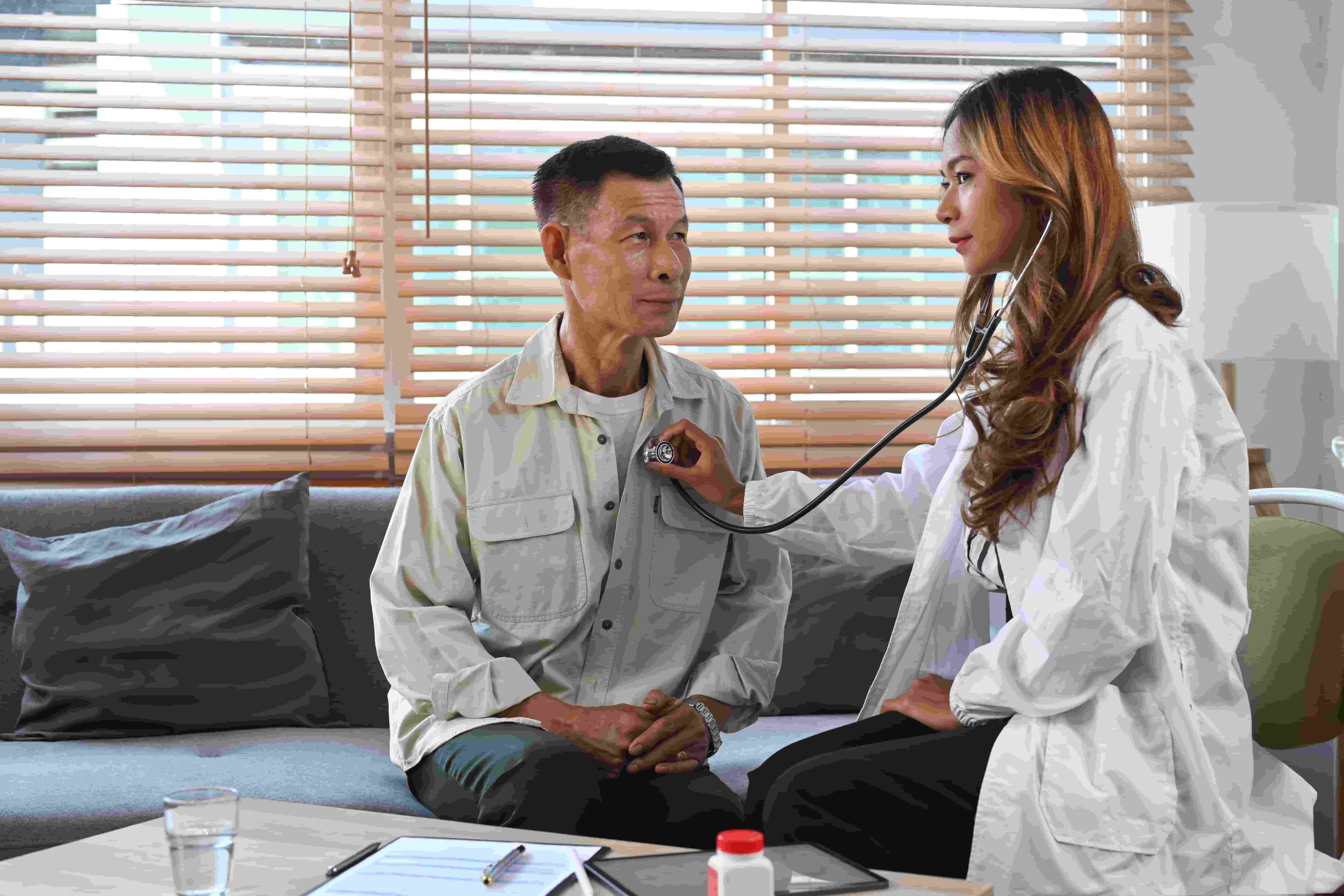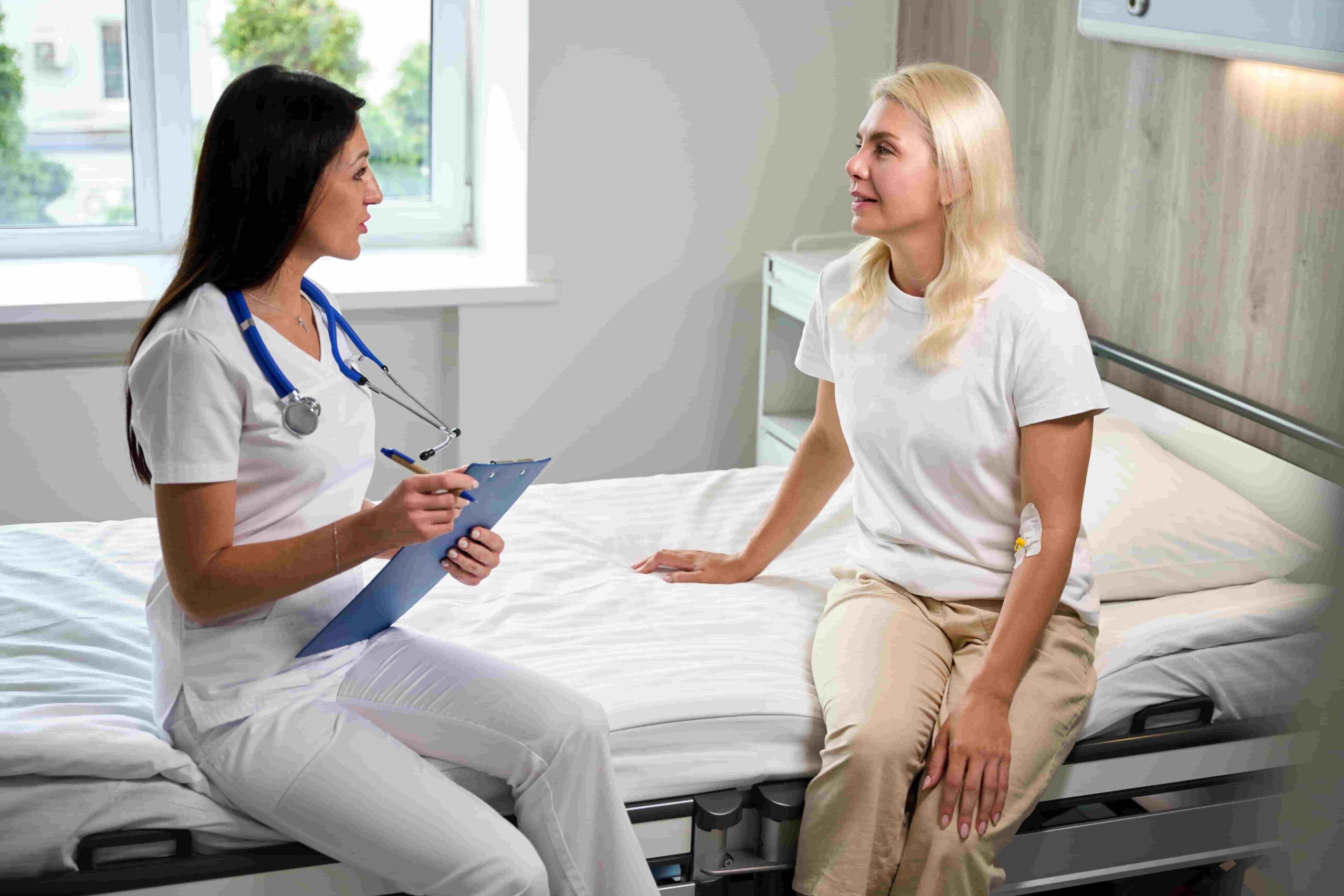We bring 20+ years of experience helping patients deal with various addictions. We perform assessments to plan the best path to recovery for you. A team of professionals is always by your side. Detox the right way at Neworld!
Prescription Drugs Detox and Addiction Treatment Clinic Toronto
Prescription drugs are widely used in our society for any number of reasons, and while they can be beneficial when taken as prescribed, they can quickly become a problem when misused. Safe medical detox followed by an addiction treatment program for prescription drugs are both important parts of recovery from substance use disorder. If you’re looking for a program that specializes in prescription drugs and detox in Toronto and Ontario, the qualified staff at Neworld Medical Detox are here to help. We specialize in helping individuals overcome withdrawal from prescription drugs safely, and support them to pursue the next stage of addiction recovery.

Services Information and Details
- At the Neworld Medical Detox centre in Ontario near Toronto, we have a specialized inpatient program providing a safe and effective way to overcome prescription drug withdrawal.
- Our medical staff include nurses and a dedicated Recovery Coordinator, who work together to manage withdrawal cravings and make our clients as comfortable as possible during their stay.
- Patients receive individualized treatment to assist them through withdrawal from prescription drugs in a safe, home-like environment that respects their privacy.
- Individuals can anticipate feeling relief from withdrawal symptoms with medication assistance as well as the emotional and mental health support provided throughout the entire process.
- Clients receive 24/7 medical supervision and medication-assisted treatment (MATs) to support safe and effective detoxification.
- At Neworld, clients are set up for long-term success in recovery, as we can assist in transitioning to a full time addiction treatment program at our sister centre, Trafalgar.
Article Key Points
- From painkillers and anxiety medication to sleep aids and stimulants, prescription drugs pose a risk of misuse and addiction (1).
- Misuse can include taking more than the recommended dose of prescription medicine, taking it with a different method of administration than prescribed, or taking medication without a prescription for non–medical reasons (1). These are warning signs that you are abusing the drug and may have developed a substance use disorder.
- At our inpatient prescription drugs detox centre, we provide a comprehensive and personalized care plan to manage withdrawal symptoms comfortably.
- Detox for prescription drugs can establish the foundation for overcoming substance use disorder, but is not a complete treatment for addiction. For those who wish to pursue long-term recovery, we can transition our patients to an intensive addiction treatment program at our sister centre, Trafalgar, where they develop the skills needed to stay in control of their addiction.
Prescription Drugs Detox Treatment
Are you looking for information about on how to safely detox your body from prescription medications?
One of the primary goals of our medically supervised detox program is to ensure that individuals are comfortable and supported throughout the process to reduce potential risks associated with withdrawal symptoms from prescription drugs. Depending on which prescription medication you have developed a dependency on, medication-assisted treatment may be utilized to help you wean off the drug. Medications can assist in reducing cravings while blocking the pleasurable effects of drug use, helping patients stay focused on their recovery journey.
To compliment prescription drug detox treatment and give patients the best chance at lasting recovery, we provide a seamless transition to the prescription drug rehab program at Trafalgar. There, addiction counsellors and registered therapists work with you to better understand personal and unique issues that may be at the root of your addiction, and provide tools and skills to help you stay on the path to recovery.

How Does Prescription Medicine Detox Treatment Work?
Medical detox is a first step toward long-term addiction treatment. Detox begins with a complete medical assessment, including a diagnosis of co-occurring disorders (pre-existing mental health issues). Once withdrawal management begins, the individual will be medically monitored by a team of experienced professionals and provided with medication to help stay comfortable as the drug leaves their system. The primary goal is to minimize uncomfortable physical and psychological withdrawal symptoms and reduce cravings.
For individuals who aren’t experiencing a severe dependency, such as those with a short-term history of prescription drugs use, outpatient detox may be a viable option. This should only be considered by those who don’t require 24/7 medical supervision or have milder addictions that can be managed at home. However, outpatient care does not provide the same level of support as an inpatient program like Neworld’s, which offers access to round-the-clock monitoring, a thorough medical assessment and a personalized exit strategy to get you back on track.
Inpatient addiction treatment rehab is the recommended next step after medical detox (2). While detox involves overcoming physical dependence on drugs, residential treatment programs go beyond merely managing physical withdrawal symptoms by providing therapeutic interventions – including individual psychotherapy sessions – designed specifically to help individuals identify and address core issues causing their substance use disorder. These programs are often necessary, depending on the drug and severity of the addiction, to develop healthier coping mechanisms to achieve long-term recovery.

Why Do You Need Prescription Drugs Addiction Treatment?
Prescription medicine has become increasingly common across the nation, and while it can be helpful when taken as prescribed, its usage can escalate into dependency especially when misused or taken non-medically. If you or someone you know is experiencing a prescription drug addiction, detoxing with medical supervision is the safest way to rid your body of the substance. Prescription drugs eventually lead to dependency, and if you stop “cold turkey”, the body will exhibit withdrawal symptoms as it adjusts to the lack of the substance. It’s possible that without supervision and detox treatment, the withdrawal symptoms may be overwhelming and result in relapse. In the case of opioids, returning to a regular dose has an increased risk of overdose if your body has adjusted to tapered use (3). Always speak with a doctor and follow their guiadance if you intend to change a prescription medication dose.
Fortunately, if you’re ready to make a change, you don’t have to do it alone. Our medical team at Neworld is dedicated solely to helping you overcome this difficult time in life, so you can finally reclaim control once more!
The Dangers of Prescription Drugs Substance Abuse Disorder
Prescription drug abuse is a serious problem in Canada and around the world. About 22 percent of Canadians 16 and older use psychoactive prescription drugs, some of them for legitimate medical purposes (1).
The risks associated with prescription drug misuse range from physical dependence and addiction to overdose fatalities (4). Whether taken alone or combined with other substances like alcohol, it can cause fatal results.
How Prescription Drugs Use Spirals Into Addiction
Addiction is characterized by compulsive and uncontrolled substance use or behaviour despite the negative consequences (5). It’s important to recognize the signs of an emerging problem with prescription drugs before it spirals into addiction so that the appropriate steps can be taken toward getting help.
When prescription drug use spirals out of control, it can lead to a severe addiction — whether someone is using for non-medical purposes or misusing medicine that has been prescribed by a doctor. It may start as simple as seeking relief from pain, insomnia, or anxiety, but eventually the individual realizes they “need” the drug to get through their day-to-day life. They begin to take more and more as tolerance increases, and discomfort without it grows too. If quitting is attempted, physical and psychological withdrawal symptoms ranging in severity will follow, potentially causing the individual to return to drug use and perpetuate the addiction.
The Most Common Prescription Medications Which Lead to Substance Abuse and Addiction
Opioids: Typically prescribed to treat pain (1).
Sedatives: Typically prescribed to help with anxiety or sleep problems.
Stimulants: Typically prescribed to help with ADHD.
Neworld Medical Detox Offers Detox Programs and Services For Anxiety Medications (Benzodiazepines)
At Neworld, we offer treatment for individuals experiencing withdrawal from benzodiazepines, also known as “benzos.” This psychoactive drug is one of the most common types of anti-anxiety medication on the market today — and is also highly addictive (6). In addition to treating anxiety, benzodiazepines are also prescribed for those who suffer from sleep disorders as they put the individual in a sedated state.
Withdrawal from benzodiazepines, especially abrupt cessation or “quitting cold turkey”, is known to cause numerous psychological effects, such as irritability, depression, anxiety, and hallucinations. In addition, once the drug begins to leave the body, side effects like restlessness, muscle and stomach pain, headache, or even seizures may begin to set in (6).

Opioid Painkillers
Opioid painkillers like oxycodone, hydrocodone, or morphine are prescribed by physicians to treat moderate to severe pain (3). This medication has a powerful effect by binding to specific receptors in the brain to reduce the feeling of pain. However, taking opioid painkillers for an extended time, or taking more than the prescribed dose, poses a high risk of developing opioid use disorder.
Unfortunately, detox from opioid painkillers can be difficult because of the unpleasant withdrawal symptoms that often occur. In addition to the physical withdrawal effects like body aches, nausea, chills and widespread pain, individuals may also experience intense cravings and a compulsion to take more of the drug (3)
We recommend medication-assisted treatment to detox from opioid painkillers to prevent associated risks of relapse and overdose. The most commonly used medications to help wean an individual off opioid painkillers are methadone and buprenorphine/naloxone (Suboxone).
Sleeping Pills (Sedatives/Hypnotics)
Sleeping pills, also known as sedatives or hypnotics, are a type of prescription drug that are commonly prescribed to combat insomnia and other sleep disorders (7). These drugs typically fall into three categories: benzodiazepines, non-benzodiazepine sleep medications and barbiturates. Since sedatives and hypnotics depress the central nervous system, they are used to induce sleep and promote relaxation. However, using these drugs will build tolerance, dependence, and ultimately lead to substance use disorder.
Withdrawal can cause serious health risks in severe cases including seizures, which is why we recommend medically assisted detox supervised by the qualified team at Neworld. During detoxification for sleeping pills, our care team will help you manage your withdrawal symptoms until the hypnotics have left your system.
Stimulants
Stimulant prescription drugs are often prescribed for the treatment of conditions like attention-deficit hyperactivity disorder (ADHD) and narcolepsy (8). Stimulants include amphetamine and methylphenidate, and can lead to physical dependance overtime. Stimulants improve attention span, concentration, and alertness, but are prone to misuse among people without a prescription.
Other Methods for Prescription Drugs Detox
Quitting “cold turkey” is one method for prescription drug detox but is rarely recommended. It has a high potential for relapse and usually withdrawal symptoms occur if addiction is present. In some cases, quitting cold turkey is dangerous, as the body has become dependent on the substance, and suddenly stopping its use could lead to severe physical and psychological side effects.
Another option is slowly tapering off at home. In order to reduce the chance of relapse and the associated risks, we recommend medically supervised detox.
Our team at Neworld Medical Detox near Toronto, Ontario, provides a safe option for those looking for help with overcoming their prescription drug addiction. Evidence-based interventions are individually tailored specifically towards addressing our clients’ unique conditions, and we provide guidance in pursuing a comprehensive rehab program to support long-term recovery post detox. Our expert team ensures your comfort during withdrawal and safely manages any symptoms to ensure you have a safe and effective detox.

Prescription Drugs Withdrawal Facts
Symptoms of Prescription Drugs Withdrawal
While the type of prescription drug and history of use will greatly impact the withdrawal symptoms experienced (3, 6, 8), the most typical symptoms associated with withdrawal include:
- Headaches
- Fatigue
- Sweating
- Insomnia
- Irritability
- Anxiety
- Intense cravings
When Does Withdrawal Start and How Long Does it Last?
Withdrawal can begin as soon as the individual stops taking their medication, however, the onset, severity and duration of symptoms vary depending on several factors (3, 8), including:
- Type of drug being taken
- Dosage of prescription being taken
- How long the drug has been taken
Quitting Prescription Meds: Cold Turkey vs. Medical Detoxification
To maximize the chances of a successful, long-term recovery, we recommend medical detoxification over quitting cold turkey. If any unexpected or uncomfortable side effects arise, medical intervention can ease your discomfort if you’re in a supervised detox program. Not only are you at risk of experiencing unpleasant physical symptoms when you suddenly cease the use of the drug, you may also experience changes in mood, such as anxiety or drug cravings, which can lead to relapse. Supervised medical detox will increase your chances of successful detox while maintaining comfort and stability.
Prescription Medication Addiction Symptoms
Various prescriptions drugs can lead to physical dependance, including increased tolerance, however this is not the same as subtance use disorder (8). Substance use disorder can be described as continued use dispite negative consequences to one’s life (9). Signs that a substance use disorder has developed include:
- Taking more than the prescribed dosage or more often than recommended
- Wanting to quit but not being able to
- Taking medicine that wasn’t prescribed to them
- Irritability, anxiety or depression
- A loss of interest in past hobbies
- Avoiding friends and loved ones
- Neglecting responsibilities
- Problems with the law
- Difficulty holding down a job or finding employment

Prescription Drugs Overdose Symptoms
Overdoses, especially involving opioids, are very dangerous and can be fatal. If you suspect someone has overdosed, call 911 right away and administer Naloxone for an opioid related overdose.
Common symptoms of an opioid overdose (10) include:
- Difficulty walking, talking, or staying awake
- Drowsiness or non-responsiveness
- Confusion and dizziness
- Clammy skin and blue or grey lips or nails
- Weak or no breathing
- Very small pupils
Helping Someone Withdrawing or Detoxing From Prescription Drugs
When it comes to helping someone who is planning to or currently tapering use of prescription drugs, you can help them by recommending comprehensive and specialized medical care through a detox centre such as Neworld.
It is also important for family members or friends of someone going through prescription drug withdrawal to become their support system. You can offer to lend them a helping hand with responsibilities around the house, such as cleaning or taking care of their pets while they are in detox. Since recovery is a life-long process, you also can do different fun and constructive activities with them to keep their mind occupied after the drugs have left their system.
Prescription Medication Withdrawal Tips
- During the withdrawal process, set daily goals and rewards that can be used as motivation when cravings become intense.
- Stay well-nourished throughout the withdrawal period by drinking a sufficient amount of water and eating well-balanced meals.
- Create a list of activities that you enjoy doing that will help keep your mind off of using, including hobbies that benefit your physical well-being (such as running or working out) as well as your mental well-being (such as journaling or meditation).
- Keep friends and family members who are supportive close to you throughout this process, as it can make all the difference in terms of staying focused on sobriety and avoiding relapse.
- Join a support group or local organization to meet other people who have gone through a similar experience. This will help you stay on track following detox and treatment.
- Take other steps towards self-care like getting enough sleep and engaging in stress management techniques like breathing exercises to reduce withdrawal symptoms.
Is Detoxing from Prescriptions Safe?
There are risks associated with detoxing from prescription drugs unsupervised, so it’s safest to consider medically supervised detox to ease withdrawal symptoms and avoid relapse. Uncomfortable withdrawal symptoms may lead one to use the drug again for relief, and returning to a regular dose or higher after your body’s tolerance has lowered poses a risk of deadly overdose in the case of opioids (3).
Detoxing from prescription medications can be safe and effective with the help of a qualified healthcare professional. However, detox alone does not treat substance use disorder, which is why it’s recommended to pursue an addiction treatment program to compliment detoxification (2). Our care teams can support clients with seamless transition into our sister centre, Trafalgar, offering addiction counselling and therapy to help achieve lasting recovery.


Start Your Recovery with Neworld Medical Detox in Ontario
Putting a stop to substance use is never easy, particularly when it comes to prescription drugs. Neworld Medical Detox’s experienced team can help those dealing with withdrawal to detox safely and start their recovery journey. Our evidence-based treatment and supportive care are designed to maximize individual success while minimizing discomfort during the withdrawal process. Contact us today for more information about our comprehensive detox program.
What Is the Next Treatment Step?
The next step towards ceasing use of prescription drugs is to give us a call or email us. Our team will gladly answer any questions or concerns about the withdrawal management program.
After successful detox at Neworld, patients who wish to can transition seamlessly to our inpatient centre, Trafalgar, where they receive a minimum 30-day addiction treatment program to compliment detox and strive for lasting sobriety. Contact us to get started today!
Information on this page is for informational purposes only, and does not replace personalized medical advice. You should never make any decisions about your health without consulting a healthcare professional, especially when related to substance use or mental health. To speak to a qualified member of our team for personalized advice, you can contact us here.
Sources
- https://www.ccsa.ca/prescription-drugs
- https://www.cmaj.ca/content/190/9/E247
- https://www.canada.ca/en/health-canada/services/opioids.html
- https://wellness.mcmaster.ca/lets-talk-about-prescription-drug-misuse/
- https://ontario.cmha.ca/addiction-and-substance-use-and-addiction/
- https://www.canada.ca/en/health-canada/services/substance-use/controlled-illegal-drugs/benzodiazepines.html
- https://www.ccsa.ca/sites/default/files/2019-06/CCSA-Canadian-Drug-Summary-Sedatives-2019-en.pdf
- https://www.canada.ca/en/health-canada/services/drugs-medication/prescription-stimulants.html
- https://www.camh.ca/en/health-info/mental-illness-and-addiction-index/addiction
- https://www.canada.ca/en/health-canada/services/opioids/overdose.html
Get Help
Our Advantages
Over 20 years Experience
Over 20 years of experience focused on medical detox
Specialize in Methadone
We specialize in getting you off Methadone
Exit Plan
Every client receives an individualized assessment from our counselors
Our Services
We offer our services in Ontario.
5 Star facility
We are a 5 Star facility in a cozy and upscale countryside setting
Personalized Treatment
Tailored treatment protocol following the most updated detox methods
Qualified Staff
A highly professional and dedicated team with extensive expertise in a variety of treatment areas
High Client Satisfaction
We deliver on-hand care and help clients to get ready for a new world.
Our Testimonials
What Clients Say About Us
Our Blogs
Bell Let’s Talk Day 2024
Our commitment on the National Day for Truth and Reconciliation
Alcohol Withdrawal and Detox: Key Steps in Addiction Recovery

GET HELP NOW
![]() +1 844-639-3389
+1 844-639-3389
Available Now